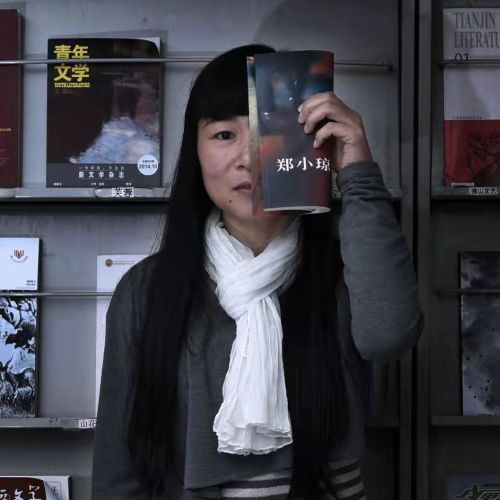
Bio
Zheng Xiaoqiong was born in Nanchong, Sichuan, and moved south to Guangdong at the age of twenty-one to work in the factories. Her poetry has been published in venues such as People’s Literature, Poetry Magazine, Independence, and Piston. She has published several collections of poetry to great acclaim. Her work has been translated into a dozen different languages and received many awards, including the prestigious Liqun People’s Literature Award. She has been invited to events around the world, from the Singapore International Migrant Artists Festival to the Rotterdam Poetry Festival. Her poetry has been frequently set to music and dramatized, with performances in the United States, Germany, and elsewhere.

Translator Bio
Eleanor Goodman
Eleanor Goodman’s translations include Something Crosses My Mind: Selected Poems of Wang Xiaoni (2014), Iron Moon: An Anthology of Chinese Workers Poetry (2017), The Roots of Wisdom: Poems by Zang Di (2017), and Days When I Hide My Corpse in a Cardboard Box: Poems of Natalia Chan (2018). She is the recipient of awards such as a Fulbright Fellowship to China, a PEN/Heim Translation Grant, the Lucien Stryk Translation Prize, and a National Endowment of the Arts Fellowship. Her newest translation is In the Roar of the Machine: Selected Poems by Zheng Xiaoqiong. She is a Research Associate at the Harvard University Fairbank Center for Chinese Studies.
What are the ecological / social crises within your region / country?
I split my time between Guangdong, Guangzhou, and Nanchong, Sichuan. The former is a coastal city in China, and the latter is a village in the country’s interior. Over the past few years, every month I’ve climbed Mt. Baiyun, a mountain within the city limits of Guangzhou encompassing over twenty square kilometers. In the mountains, I’ve come to recognize the trees, flowering plants, birds, snakes, and other animals. The mountain is a protected area, and there are the remains of old abandoned homes whose occupants have been relocated, along with cultural relics like ancient Chinese temples and traces of ancient poets. I’ve written a lot of poetry about Mt. Baiyun, and every time I head down the road to the city outskirts and see the protected area and its land, I always feel tremendously moved. For a time I was in close communication with a volunteer group involved in environmental protection, and I went with them to test the levels of contamination in the land, water, and vegetation in the city outskirts after the industrialization of the area, which included harmful excesses of heavy metals, water pollution, and air pollution. While industry has brought humankind development and advantages, it has also done catastrophic harm to the environment in which human beings exist. For example, the overwhelming daily use of plastics, glass, paper products, and so on has resulted in the contamination of fields used to produce food. I rent a place in the Yongtai neighborhood of Guangzhou, a cramped ‘urban village’ in which more than ten thousand people live. Each day we face the problem of sorting, transporting, and dealing with the waste produced in daily life. In the villages of Sichuan, early on farmers used green fertilizers and organic soil enhancers, but today hardly anyone uses these natural fertilizers and instead relies on chemical fertilizers and agricultural pesticides, which do not decompose readily. This means that the environment is facing irreversible damage, such as the disappearance of some aquatic creatures that are sensitive to water quality from the streams and rivers. Aside from the destruction of the natural environment, I concentrate more on the construction of human environments. I focus on the situation facing manual laborers, and the harm done to their bodies by industrial pollution. These workers are inflicted with occupational illnesses such as pneumoconiosis, dermatitis, lung cancer, and so on. In writing about these diseases facing these workers, I hope my poetry will cause more people to pay attention to the human damage brought by industry and how it can be reduced.